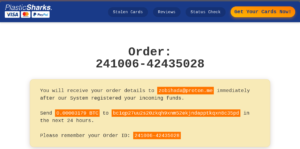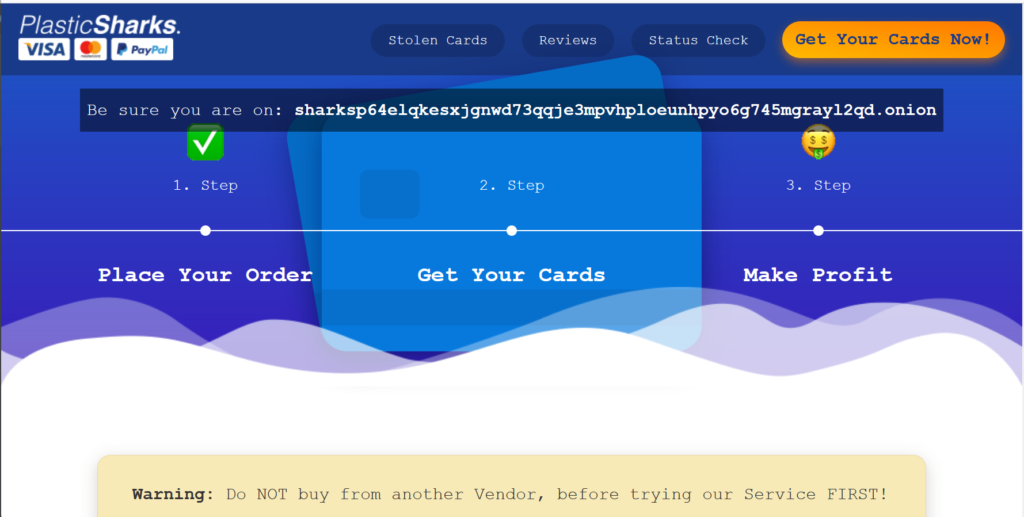Table of Contents
TogglePlasticsSharks – TOR Scam Report (1)
Onion Link: http://sharksp64elqkesxjgnwd73qqje3mpvhploeunhpyo6g745mgrayl2qd.onion
Scam Report Date: 2024/10/07
Client Scam Report Breakdown
Original Report Summary:
In the scam report submitted by the user regarding the online platform PlasticSharks, the scam is initiated through deceptive use of Bitcoin (BTC) payment addresses. According to the report, the victim initially lost $2 after attempting to purchase a product from the site. Upon completing the payment, the site generated a new BTC address for further payments. Instead of confirming the order or delivering the product, the system looped the victim into making additional payments by continuously changing the BTC address each time they attempted to track their order. The victim is clear in stating that once a payment is made, nothing happens other than being prompted to send more money, with no actual delivery of goods. The platform also demands that payments be made within a 24-hour window, creating urgency and pressuring users to act quickly without properly evaluating the situation. The victim concludes that PlasticSharks is a fraudulent platform designed to extract money without delivering any products.
Photos:

Terminology and Scamming Tactics
Key to understanding this scam is the platform’s manipulation of cryptocurrency transactions, specifically through Bitcoin (BTC). Bitcoin is a decentralized digital currency that operates without a central bank or single administrator. Transactions are conducted peer-to-peer, verified through cryptography, and recorded in a public ledger called the blockchain. In this case, the scam leverages the anonymity and irreversible nature of BTC transactions to exploit the victim. When the user mentions that the BTC address changes with each payment attempt, this is a technique often used in phishing and scam sites known as “address spoofing”. This term refers to the deliberate alteration or creation of a new payment address each time a user attempts to make a transaction. In legitimate online purchases, once a payment is made, the transaction details remain consistent until the product is shipped or delivered. However, in the PlasticSharks case, the constant changing of the BTC address ensures that the scam continues to siphon money from the victim without providing anything in return. This method is particularly effective in cryptocurrency scams because it obfuscates the scammer’s identity and makes it difficult for victims to track or recover their funds.
Additionally, the demand for payment within 24 hours is a typical “time pressure tactic” often used by scammers to rush victims into making impulsive decisions. By creating a sense of urgency, victims are more likely to ignore red flags and proceed with the transaction in fear of missing out on a deal or service. This tactic plays on human psychology, particularly a sense of scarcity or fear of loss, which can override rational decision-making processes. The victim’s experience aligns with a broader trend of exit scams in the deep web marketplace space, where a platform continues to accept payments while never intending to deliver the promised goods or services.
Conclusion and Advice for Users
The report on PlasticSharks reveals several important red flags for potential scam victims. The first indicator is the repeated generation of new Bitcoin addresses, a clear signal that the platform intends to extort funds without delivering any products. This tactic, coupled with the 24-hour payment window, is designed to exploit the anonymous and irreversible nature of Bitcoin transactions. Once money is sent via Bitcoin, it is difficult, if not impossible, to retrieve it without the recipient’s cooperation, which scammers rely on. The victim’s $2 loss, while relatively minor, could have been much larger had they not recognized the scam early on.
To avoid falling prey to such scams, users should be wary of any site that pressures them into making payments under tight deadlines, especially when using cryptocurrencies. Legitimate businesses typically provide clear, consistent payment information and reasonable time frames for order processing. If payment details like BTC addresses are continually changing, or if no product or order confirmation is received after payment, it is likely a scam. Additionally, it’s crucial for users to research a platform’s reputation before making any payments, especially on deep web marketplaces, where scams like PlasticSharks are increasingly common.






